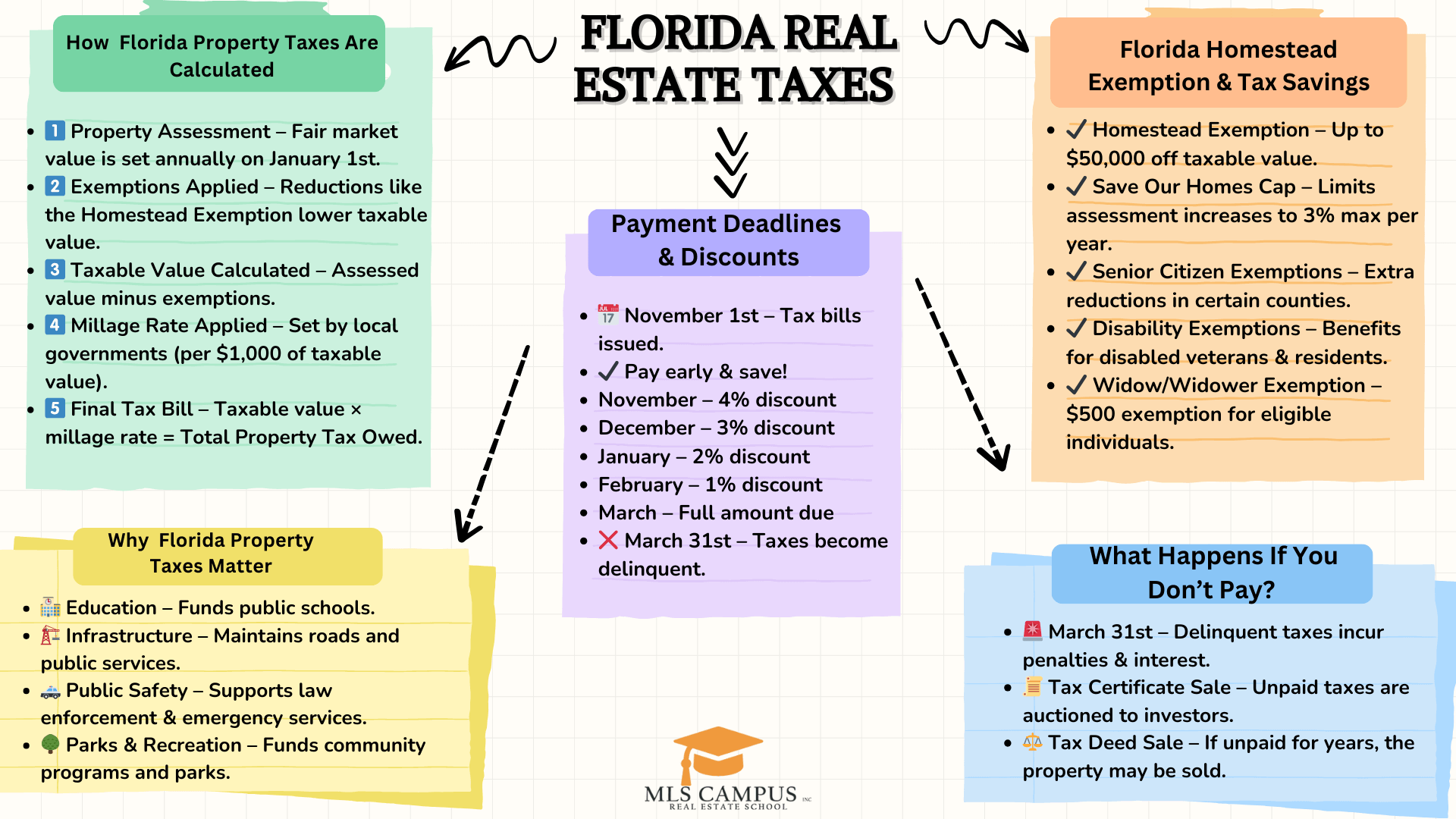
Are you a real estate agent in Florida striving to provide your clients with the best advice? Or perhaps you’re a homebuyer or homeowner curious about property taxes in the Sunshine State? Understanding Florida real estate taxes is essential for making informed financial decisions, whether you’re navigating the real estate market as a professional or an individual.
Florida’s real estate tax system can seem complex, but you can navigate it successfully with the right knowledge. This guide will provide a clear and concise overview of Florida property taxes, ensuring you stay informed and ahead of the Florida real estate market curve.
Why Understanding Florida Property Taxes Matters
Understanding Florida property taxes is not just about individual financial planning; it’s also about contributing to the well-being of your community. Property taxes are a primary source of funding for essential local services, including:
- Education: Funding public schools and educational programs.
- Infrastructure: Maintaining roads, bridges, and other public infrastructure.
- Public Safety: Supporting law enforcement, fire departments, and emergency services.
- Parks and Recreation: Maintaining parks, recreational facilities, and community programs.
By understanding and paying your property taxes, you directly invest in the quality of life in your local community.
In this blog, we’ll explore key aspects of Florida real estate taxes, including:
- Understanding Property Assessments
- Homestead Exemptions and Other Tax Savings
- Tax Rates and How They’re Calculated
- Payment Options and Deadlines
- Appealing Your Property Tax Assessment
Whether you’re a real estate professional, a homebuyer, or a long-time homeowner, this guide will provide valuable insights into Florida real estate taxes.
Understanding Florida’s Property Tax System
Florida’s property tax framework is established under the Florida Constitution and outlined in Chapter 193 of the Florida Statutes. These taxes serve as a crucial revenue stream for local authorities, supporting fundamental services, including education, infrastructure, and public safety.
Key Players:
- Property Appraiser: Each county in Florida employs a Property Appraiser tasked with assessing the fair market value of all properties within their jurisdiction.
- To find your County’s Property Appraiser: Search on Google for “[Your County Name] Florida Tax Collector”. The official website will provide information on property tax payments and deadlines.
- Tax Collector: The Tax Collector collects property taxes and distributes them to the various taxing authorities.
- Value Adjustment Board (VAB): This board hears appeals from property owners who believe their property assessment is incorrect.
- To find your County’s Value Adjustment Board (VAB): Search on Google for “[Your County Name] Florida Value Adjustment Board”. The official website (often within the County Clerk’s or Property Appraiser’s site) will provide information on how to file an appeal.
How Property Taxes Are Calculated:
- Property Assessment: The Property Appraiser evaluates the fair market value of your property annually as of January 1st.
- Exemptions: Apply for any exemptions you’re eligible for, such as the Homestead Exemption.
- Taxable Value: The taxable value is the assessed value minus any exemptions.
- Millage Rate: Each taxing authority (county, city, school district, etc.) sets a millage rate, which is the amount of tax per $1,000 of taxable value.
- Tax Calculation: Property taxes are calculated by multiplying the taxable value by the total millage rate.
Homestead Exemption and Other Tax Savings
Florida offers several exemptions that can significantly reduce your property tax bill. The most well-known is the Homestead Exemption.
Homestead Exemption:
- Eligibility: Available to Florida residents who own and occupy a property as their permanent residence.
- Benefit: Reduces the taxable value of your property by up to $50,000. The first $25,000 applies to all taxes, and the additional $25,000 is applicable to the assessed value ranging from $50,000 to $75,000 and does not apply to school district taxes.
- Filing Deadline: Must apply by March 1st.
- Portability: Florida also allows homeowners to transfer (“port”) their accumulated Save Our Homes benefit (cap on assessment increases) to a new homestead property within the state.
Other Exemptions:
- Senior Citizen Exemptions: Some counties offer additional exemptions for seniors with limited income.
- Disability Exemptions: Exemptions are available for disabled veterans and individuals with permanent disabilities.
- Widow/Widower Exemption: Widows and widowers are eligible for a $500 exemption.
Save Our Homes Assessment Limitation:
- The Save Our Homes assessment limitation caps the annual increase in assessed value for properties with a homestead exemption to 3% or the percentage change in the Consumer Price Index (CPI), whichever is lower.
Tax Rates and How They’re Determined
Millage rates are set annually by the various taxing authorities in each county. These rates are expressed as dollars per $1,000 of taxable value.
Understanding Millage Rates:
- Each taxing authority (county, city, school board, special districts) sets its own millage rate.
- The total millage rate is the sum of all individual millage rates.
- Millage rates can vary significantly from county to county and even within different areas of the same county.
Finding Millage Rates:
- Contact your county’s Property Appraiser or Tax Collector.
- Review your Truth in Millage (TRIM) notice, which is mailed to property owners each August.
Payment Options and Deadlines
Florida property taxes are typically due on November 1st and are delinquent after March 31st of the following year.
Payment Options:
- Online: Most counties offer online payment options through the Tax Collector’s website.
- Mail: Send a check or money order to the Tax Collector’s office.
- In-Person: Visit the Tax Collector’s office to pay in person.
Discounts for Early Payment:
- Pay in November: 4% discount
- Pay in December: 3% discount
- Pay in January: 2% discount
- Pay in February: 1% discount
- Pay in March: No discount
Delinquent Taxes:
- If taxes are not paid by March 31st, they become delinquent, and interest and penalties are added.
- The Tax Collector will then hold a tax certificate sale, where investors can bid on the unpaid taxes.
- The property may eventually be subject to a tax deed sale if the taxes remain unpaid.
Appealing Your Property Tax Assessment
If you believe your property assessment is too high, you have the right to appeal it.
Steps to Appeal:
- Review Your TRIM Notice: Carefully review your Truth in Millage (TRIM) notice, which is mailed in August.
- Contact the Property Appraiser: Discuss your concerns with the Property Appraiser’s office. They may be able to resolve the issue informally.
- File a Petition with the Value Adjustment Board (VAB): If you’re unsatisfied with the Property Appraiser’s response, file a petition with the VAB by the deadline (usually in September).
- Attend a Hearing: The VAB will hold a hearing where you can present evidence to support your claim.
- VAB Decision: The VAB will make a decision based on the evidence presented.
Tips for a Successful Appeal:
- Gather evidence to support your claim, such as comparable sales data or photos of property defects.
- Be prepared to present your case clearly and concisely.
- Consider hiring a real estate attorney or appraiser to assist you.
Frequently Asked Questions (FAQ) About Florida Real Estate Taxes
1. How often are properties reassessed in Florida?
Properties are reassessed every year as of January 1st. However, due to the Save Our Homes assessment limitation, the assessed value of homesteaded properties may not increase by more than 3% annually (or the CPI change, if lower).
2. What happens if I don’t pay my property taxes?
If you don’t pay your property taxes by March 31st, they become delinquent, and interest and penalties are added. The Tax Collector will hold a tax certificate sale. If the taxes remain unpaid, the property may eventually be subject to a tax deed sale, and you could lose your property.
3. Can I pay my property taxes with a credit card?
Yes, most counties allow you to pay your property taxes online with a credit card, but a small convenience fee may apply.
4. What is the “TRIM” notice?
TRIM stands for “Truth in Millage.” A notice mailed to property owners each August provides information about proposed property taxes, including the property’s assessed value, proposed millage rates, and dates for public hearings.
5. can I still claim the homestead exemption if I rent out my property?
No, you cannot claim the homestead exemption if you rent your property, as it must be your primary residence.
6. Can I protest my property taxes if I feel they are unfairly high?
Yes, you have the right to appeal your property assessment if you believe it is too high. The process involves reviewing your TRIM notice, contacting the Property Appraiser, and potentially filing a petition with the Value Adjustment Board (VAB).
7. What is a tax certificate sale?
If property taxes are not paid, the Tax Collector can hold a tax certificate sale, where investors bid on the right to collect the unpaid taxes plus interest. This does not mean the investor owns your property, but it creates a lien on the property.
Ready to Launch Your Florida Real Estate Career? MLS Campus is Your Partner!
At MLS Campus, we’re committed to your success in Florida real estate. Whether you’re a novice or a seasoned agent aiming for career advancement, our accessible courses and expert mentorship provide the knowledge and assurance you need to flourish.
Why Choose MLS Campus?
Comprehensive Course Selection
Explore the fundamentals of real estate and master advanced techniques tailored for the Florida market through our detailed course options:
- Sales Associate Pre-License 63 Hour: Your first step to obtaining your real estate license in Florida.
- Sales Associate Post-License 45 Hour: Refine your skills and knowledge following initial licensure.
- Broker Pre-License 72 Hour: Designed for experienced sales associates seeking to elevate their careers.
- Broker Post-License: Further develop your expertise as a newly licensed broker.
- Continuing Education 14 Hour: Stay current with industry trends and meet ongoing licensing requirements.
- Reactivation 28 Hour: Reinstate your inactive license and get back to business.
Expert Instruction & Support
Benefit from experienced instructors and reliable tech support.
Flexible Learning Environment
Study anytime, anywhere with our user-friendly platform. Access courses on your PC, Mac, Tablet, or Smartphone.
With MLS Campus, gain the necessary expertise and abilities to excel in Florida’s competitive real estate market. Begin your journey with us today!
30 Days Limited Money Back Guarantee Policy
If you decide you’re not 100% satisfied within the First 30 Days of your initial purchase, simply contact us by email and request a cancellation and full refund. You will receive a full refund of your purchase price. If the final exam has been taken, a refund can not be issued. The Real Estate Exam Prep Master and the Exam Prep Math, if purchased separately are not refundable.
Course Duration
The course is active for six months from the date of purchase. We offer the 7th month for free if needed. If your course has been active for 7 months or more, you can purchase one-month extensions. It is possible to have the course extended by up to one year by purchasing monthly extensions online.
Customer Support: Call us at (877) 331-6235 or Contact us by Email
If we can assist you with Technical Support, General License Inquiries or Questions about Course Material please contact us.
Questions about course material: An Instructor is available Monday through Friday a week from 9 am to 7 pm (EST)
Technical Support or any other questions: Our office staff are available Monday through Friday a week from 9 am to 7 pm (EST)
We do our best to reply promptly to emails on Weekends
*Except for Major Holidays
Join Over 100,000 Students Enroll With MLS Campus now
Become Part of MLS Campus School to Further Your Career.












